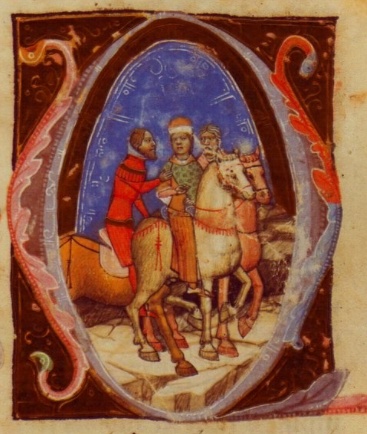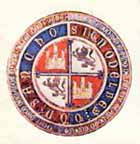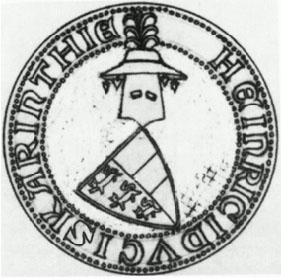|
1308
Year 1308 ( MCCCVIII) was a leap year starting on Monday (link will display the full calendar) of the Julian calendar. Events By place Europe * November 13 – The Teutonic Knights capture Gdańsk by treachery – while a Brandenburger force of 100 knights and 200 followers led by Heinrich von Plötzke and Günther von Schwarzburg, disputed king of Germany, lay siege to the city. The garrison of Gdańsk castle is too weak to defend itself against the Brandenburgers. Meanwhile, Władysław I Łokietek (Elbow-High), Polish ruler of Gdańsk Pomerania, is unable to send reinforcements. The citizens call upon the Teutonic Knights for military help and offer to pay their costs. The arrival of the knights, lead the Brandenburgers to beat a hasty retreat. In an act of supreme treachery, the Teutonic Knights attack the city they have come to save. The houses of both Polish and German are burnt and destroyed. Many people are slaughtered without mercy, including women a ... [...More Info...] [...Related Items...] OR: [Wikipedia] [Google] [Baidu] |
Henry VII, Holy Roman Emperor
Henry VII (German: ''Heinrich''; c. 1273 – 24 August 1313),Kleinhenz, pg. 494 also known as Henry of Luxembourg, was Count of Luxembourg, King of Germany (or '' Rex Romanorum'') from 1308 and Holy Roman Emperor from 1312. He was the first emperor of the House of Luxembourg. During his brief career he reinvigorated the imperial cause in Italy, which was racked with the partisan struggles between the divided Guelf and Ghibelline factions, and inspired the praise of Dino Compagni and Dante Alighieri. He was the first emperor since the death of Frederick II in 1250, ending the Great Interregnum of the Holy Roman Empire; however, his premature death threatened to undo his life's work. His son, John of Bohemia, failed to be elected as his successor, and there was briefly another anti-king, Frederick the Fair, contesting the rule of Louis IV. Life Election as King of the Romans Born around 1273 in Valenciennes, he was a son of Count Henry VI of Luxembourg and Béatrice from the ... [...More Info...] [...Related Items...] OR: [Wikipedia] [Google] [Baidu] |
Charles I Of Hungary
Charles I, also known as Charles Robert ( hu, Károly Róbert; hr, Karlo Robert; sk, Karol Róbert; 128816 July 1342) was King of Hungary and Croatia from 1308 to his death. He was a member of the Capetian House of Anjou and the only son of Charles Martel, Prince of Salerno. His father was the eldest son of Charles II of Naples and Mary of Hungary. Mary laid claim to Hungary after her brother, Ladislaus IV of Hungary, died in 1290, but the Hungarian prelates and lords elected her cousin, Andrew III, king. Instead of abandoning her claim to Hungary, she transferred it to her son, Charles Martel, and after his death in 1295, to her grandson, Charles. On the other hand, her husband, Charles II of Naples, made their third son, Robert, heir to the Kingdom of Naples, thus disinheriting Charles. Charles came to the Kingdom of Hungary upon the invitation of an influential Croatian lord, Paul Šubić, in August 1300. Andrew III died on 14 January 1301, and within four mon ... [...More Info...] [...Related Items...] OR: [Wikipedia] [Google] [Baidu] |
Ferdinand IV Of Castile
Ferdinand IV of Castile (6 December 1285 – 7 September 1312) called the Summoned (''el Emplazado''), was King of Castile and León from 1295 until his death. His upbringing and the custody of his person were entrusted to his mother, Queen María de Molina, while his tutorship was entrusted to his granduncle Henry of Castile the Senator. At that time, and also for the rest of his reign, his mother tried to placate the nobility, confronted her son's enemies, and repeatedly prevented Ferdinand IV from being dethroned. He faced the insubordination of the nobility, led at numerous times by his uncle John of Castile, Lord of Valencia de Campos, and by Juan Núñez II de Lara, who were supported in some occasions by another royal relative, Juan Manuel, Prince of Villena. Like his predecessors on the throne, Ferdinand IV continued the Reconquista and, although he failed to conquer Algeciras in 1309, he captured the city of Gibraltar that same year, and in 1312 the city of Alcaudete wa ... [...More Info...] [...Related Items...] OR: [Wikipedia] [Google] [Baidu] |
Gdańsk
Gdańsk ( , also ; ; csb, Gduńsk;Stefan Ramułt, ''Słownik języka pomorskiego, czyli kaszubskiego'', Kraków 1893, Gdańsk 2003, ISBN 83-87408-64-6. , Johann Georg Theodor Grässe, ''Orbis latinus oder Verzeichniss der lateinischen Benennungen der bekanntesten Städte etc., Meere, Seen, Berge und Flüsse in allen Theilen der Erde nebst einem deutsch-lateinischen Register derselben''. T. Ein Supplement zu jedem lateinischen und geographischen Wörterbuche. Dresden: G. Schönfeld’s Buchhandlung (C. A. Werner), 1861, p. 71, 237.); Stefan Ramułt, ''Słownik języka pomorskiego, czyli kaszubskiego'', Kraków 1893, Gdańsk 2003, ISBN 83-87408-64-6. * , )Johann Georg Theodor Grässe, ''Orbis latinus oder Verzeichniss der lateinischen Benennungen der bekanntesten Städte etc., Meere, Seen, Berge und Flüsse in allen Theilen der Erde nebst einem deutsch-lateinischen Register derselben''. T. Ein Supplement zu jedem lateinischen und geographischen Wörterbuche. Dresden: G. Schönf ... [...More Info...] [...Related Items...] OR: [Wikipedia] [Google] [Baidu] |
Władysław I Łokietek
Władysław I Łokietek, in English known as the "Elbow-high" or Ladislaus the Short (c. 1260/12 March 1333), was King of Poland from 1320 to 1333, and duke of several of the provinces and principalities in the preceding years. He was a member of the royal Piast dynasty, the son of Duke Casimir I of Kuyavia, and great-grandson of High-Duke Casimir II the Just. Władysław I inherited a small portion of his father's domain, but his dominion grew as some of his brothers died young. He unsuccessfully tried to incorporate the Duchy of Krakow (the Seniorate Province) in 1289, following the death of his half-brother Leszek II the Black and the withdrawal from contention of his ally Bolesław II of Masovia. After a period in exile during the rule of Wenceslaus II, Władysław regained several duchies and then Krakow in 1306 when Wenceslaus III was murdered. He temporarily took control of part of Greater Poland after the death of his ally Przemysł II, lost it, and then subsequently reg ... [...More Info...] [...Related Items...] OR: [Wikipedia] [Google] [Baidu] |
Henry Of Bohemia
Henry of Gorizia (german: Heinrich, cs, Jindřich; – 2 April 1335), a member of the House of Gorizia, was Duke of Carinthia and Landgrave of Carniola (as Henry VI) and Count of Tyrol from 1295 until his death, as well as King of Bohemia, Margrave of Moravia and titular King of Poland in 1306 and again from 1307 until 1310. After his death, the Habsburgs took over Carinthia and Carniola and held them almost without interruption until 1918. Life Henry was a younger son of Count Meinhard II of Görz-Tyrol and Elizabeth of Bavaria, widow of King Conrad IV of Germany. Upon the partition of the Meinhardiner estates in 1271, his father maintained the Tyrolean lands, while Henry's uncle Albert received the County of Gorizia. In 1276 Count Meinhard married his eldest daughter, Henry's sister Elizabeth, to Albert, son of King Rudolph I of Germany, and in turn was enfeoffed with the Duchy of Carinthia in 1286. After his father's death in late October 1295, Henry inherited the Tyrolean ... [...More Info...] [...Related Items...] OR: [Wikipedia] [Google] [Baidu] |
Holy Roman Empire
The Holy Roman Empire was a Polity, political entity in Western Europe, Western, Central Europe, Central, and Southern Europe that developed during the Early Middle Ages and continued until its Dissolution of the Holy Roman Empire, dissolution in 1806 during the Napoleonic Wars. From the accession of Otto I in 962 until the twelfth century, the Empire was the most powerful monarchy in Europe. Andrew Holt characterizes it as "perhaps the most powerful European state of the Middle Ages". The functioning of government depended on the harmonic cooperation (dubbed ''consensual rulership'' by Bernd Schneidmüller) between monarch and vassals but this harmony was disturbed during the Salian Dynasty, Salian period. The empire reached the apex of territorial expansion and power under the House of Hohenstaufen in the mid-thirteenth century, but overextending led to partial collapse. On 25 December 800, Pope Leo III crowned the List of Frankish kings, Frankish king Charlemagne as Carolingi ... [...More Info...] [...Related Items...] OR: [Wikipedia] [Google] [Baidu] |
Baldwin Of Luxembourg
Baldwin of Luxembourg (c. 1285 – 21 January 1354) was the Archbishop- Elector of Trier and Archchancellor of Burgundy from 1307 to his death. From 1328 to 1336, he was the diocesan administrator of the archdiocese of Mainz and from 1331 to 1337 (with interruptions) of those of Worms and Speyer. He was one of the most important German prelates of his age. Born in Luxembourg to the count Henry VI, he was intended for an ecclesiastic career at an early age. He studied theology and canon law at the University of Paris, for his family was on good terms with the Capetian court of France. He was only twenty-two years of age when elected Archbishop of Trier in 1307. In 1308, he was consecrated bishop by Pope Clement V in Poitiers. He quickly became one of the most influential princes in Germany, influencing the election that year of his brother Henry VII as King and Holy Roman Emperor. From 1310 to 1313, Baldwin accompanied Henry in Italy, where he was crowned emperor in Rome on 29 ... [...More Info...] [...Related Items...] OR: [Wikipedia] [Google] [Baidu] |
Teutonic Order
The Order of Brothers of the German House of Saint Mary in Jerusalem, commonly known as the Teutonic Order, is a Catholic religious institution founded as a military society in Acre, Kingdom of Jerusalem. It was formed to aid Christians on their pilgrimages to the Holy Land and to establish hospitals. Its members have commonly been known as the Teutonic Knights, having a small voluntary and mercenary military membership, serving as a crusading military order for the protection of Christians in the Holy Land and the Baltics during the Middle Ages. Purely religious since 1810, the Teutonic Order still confers limited honorary knighthoods. The Bailiwick of Utrecht of the Teutonic Order, a Protestant chivalric order, is descended from the same medieval military order and also continues to award knighthoods and perform charitable work. Name The name of the Order of Brothers of the German House of Saint Mary in Jerusalem is in german: Orden der Brüder vom Deutschen Haus der He ... [...More Info...] [...Related Items...] OR: [Wikipedia] [Google] [Baidu] |
Heinrich Von Plötzke
Heinrich von Plötzke ( 1264 – 27 July 1320 in Varniai, Medininkai, Lithuania) was an officer of the Teutonic Knights, Teutonic Order during the late 13th and early 14th centuries. Heinrich was the Komtur of Altenburg in 1286 and of Halle, Saxony-Anhalt, Halle in 1287, after which he was transferred to Prussia (region), Prussia. He became the Komtur of Balga in 1294. Heinrich served as the Landmeister of Prussia from 1307–1309, and he was based in Elbląg, Elbing. Hochmeister Siegfried von Feuchtwangen, Heinrich (and a relative of Gunther von Schwarzburg of the same name) led the Order's forces which relieved Margraviate of Brandenburg, Brandenburg's siege of Gdańsk, Danzig in 1308, but refused to relinquish the city to King Władysław I the Elbow-high of Poland who did not offer enough reimbursement for the Order's expenses. This led to the Teutonic takeover of Danzig. By the Treaty of Soldin (1309), Treaty of Soldin of 1309, Heinrich purchased Brandenburg's claims on Pomer ... [...More Info...] [...Related Items...] OR: [Wikipedia] [Google] [Baidu] |
Jan Muskata
Jan Muskata (1250 – 7 February 1320) was bishop of Kraków from 1294 to 1309. Muskata was born in Wrocław, Silesia. He was the son of a German spice trader. The name Muskata is derived from Latin, for nutmeg. He had brother named Stefan (fl. 1315). He was educated in Bologna and became bishop in 1294. He supported Przemysł II of Poland, but after his assassination he joined the side of Venceslaus II of Bohemia. He served as his vice-chancellor in 1301 and also worked with his son. When Władysław I the Elbow-high took hold of Kraków, the bishop was in strong opposition to Władysław, whom he excommunicated. In response Władysław had him imprisoned in 1308, which led the bishop to appeal to the Pope. The bishop was released in 1309. Under Wójt Albert and with Muskata's support, the Kraków burgher's revolted in 1311 against Władysław, but were suppressed. Bishop Muskata was declared "an enemy of the Polish People" by Jakub Świnka, Archbishop of Gniezno. His suc ... [...More Info...] [...Related Items...] OR: [Wikipedia] [Google] [Baidu] |
Croatia In Personal Union With Hungary
The Kingdom of Croatia ( la, Regnum Croatiae; hr, Kraljevina Hrvatska, ''Hrvatsko kraljevstvo'', ''Hrvatska zemlja'') entered a personal union with the Kingdom of Hungary in 1102, after a period of rule of kings from the Trpimirović and Svetoslavić dynasties and a succession crisis following the death of king Demetrius Zvonimir. With the coronation of King Coloman of Hungary as "King of Croatia and Dalmatia" in 1102 in Biograd, the realm passed to the Árpád dynasty until 1301, when the (male) line of the dynasty died out. Then, kings from the Capetian House of Anjou, who were also cognatic descendants of the Árpád kings, ruled the kingdoms. Later centuries were characterized by conflicts with the Mongols, who sacked Zagreb in 1242, competition with Venice for control over Dalmatian coastal cities, and internal warfare among Croatian nobility. Various individuals emerged during the period, such as Paul I Šubić of Bribir, who was representing the most powerful Croatian d ... [...More Info...] [...Related Items...] OR: [Wikipedia] [Google] [Baidu] |



.jpeg/1200px-Brama_Zuraw_W_Gdansku_(153003103).jpeg)


